Quitting smoking across cultures and occupations: Taghrid Asfar, M.S.P.H. ’14
 A native of Syria, a country where tobacco use is widespread and embedded in the culture, Taghrid Asfar saw firsthand how much of a public health problem smoking was in her country. As a young physician in the late 1990s and early 2000s, she recognized the scale of the challenge and the fact that treatments for tobacco and nicotine addiction were non-existent. “I saw the great need to improve tobacco prevention and treatment and never stopped doing it.”
A native of Syria, a country where tobacco use is widespread and embedded in the culture, Taghrid Asfar saw firsthand how much of a public health problem smoking was in her country. As a young physician in the late 1990s and early 2000s, she recognized the scale of the challenge and the fact that treatments for tobacco and nicotine addiction were non-existent. “I saw the great need to improve tobacco prevention and treatment and never stopped doing it.”
Now an associate professor of public health sciences at the Miller School of Medicine, Asfar was named the Outstanding Population Scientist Researcher of the Year by Sylvester Comprehensive Cancer Center in 2022. In the two decades since she first started working on smoking cessation in Syria, Asfar has become an internationally known expert on reducing tobacco use and tobacco-related deaths. She is the principal investigator in several efforts to advance health communications strategies to limit tobacco use among children and young adults.
In February 2023, Asfar was awarded a $1.4 million grant from the James and Esther King Biomedical Research Program to help construction workers—an occupation whose smoking rate is double that of the general population—to quit smoking.
Learn more about Asfar’s current work
Keeping the candle of hope burning for Afghan women: Zakera Azizi, M.I.B.S. ’22
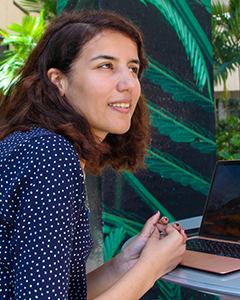 Zakera Azizi knows and appreciates more than most the power of education. As an Afghan official working with the U.S.-backed Afghanistan government, she was a passionate advocate for women’s rights in her country. When the government was toppled in August 2021, Azizi was transported out of Kabul on a U.S. military plane, eventually coming to the University of Miami.
Zakera Azizi knows and appreciates more than most the power of education. As an Afghan official working with the U.S.-backed Afghanistan government, she was a passionate advocate for women’s rights in her country. When the government was toppled in August 2021, Azizi was transported out of Kabul on a U.S. military plane, eventually coming to the University of Miami.
Since graduating last fall with a master's degree in international business, Azizi has sought a job in finance and nurtured her passion for helping women and girls in her home country, who are now barred from anything more than elementary school education. Working in partnership with Global Co Lab Network, an international organization that empowers young people worldwide, she launched a project that provides weekly English classes to a small group of women in Afghanistan.
“I just knew I needed to start something to help women and girls in Afghanistan,” Azizi said. “School, university, and work are banned for women in Afghanistan. They can’t go outside; they’re almost always at home. We have to give them hope.”
Braving the elements to unlock the oceans’ secrets: Lisa Beal, professor of oceanography
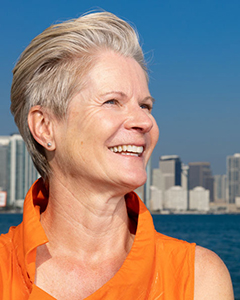 Originally from the United Kingdom, Lisa Beal is at home on the ocean—no matter how distant the voyage or how stormy the waters. A professor at the Rosenstiel School of Marine, Atmospheric, and Earth Science, Beal has made 17 research expeditions to the Atlantic and Indian Oceans and logged 357 days at sea, all to explore and study how the world’s oceans shape the global climate.
Originally from the United Kingdom, Lisa Beal is at home on the ocean—no matter how distant the voyage or how stormy the waters. A professor at the Rosenstiel School of Marine, Atmospheric, and Earth Science, Beal has made 17 research expeditions to the Atlantic and Indian Oceans and logged 357 days at sea, all to explore and study how the world’s oceans shape the global climate.
One area where Beal is an expert: the Agulhas Current, which flows southward in the Indian Ocean along the east coast of South Africa. Beal recently embarked on a 26-day voyage with an international team of researchers to measure how much of its warm, salty water the Agulhas “leaks” into the South Atlantic, which carries potential climate impacts.
On dry land, Beal works to increase the engagement, recruitment, and retention of women and minorities in oceanography and to advance resources and capacity for ocean sciences in southern Africa. “In order to embrace what science informs us about ourselves and our planet, everyone needs to be a part of it,” Beal said. “When we do not include everyone in the science, we have blind spots. And the science suffers.”
Building resilience in South Florida and beyond: Sonia Chao, B.Arch. ’83
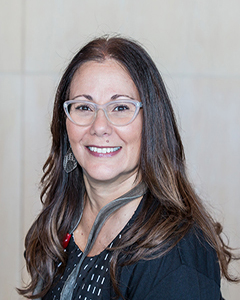 Many of South Florida’s most historic and architecturally significant buildings and neighborhoods are vulnerable to flooding and sea level rise—a vulnerability shared with coastal communities all over the globe. As a research associate professor in the School of Architecture, founding director of the Center for Urban and Community Design, and co-lead of the education committee for the Climate Resilience Academy, Sonia Chao is on the front lines of responding to the urgent need for solutions.
Many of South Florida’s most historic and architecturally significant buildings and neighborhoods are vulnerable to flooding and sea level rise—a vulnerability shared with coastal communities all over the globe. As a research associate professor in the School of Architecture, founding director of the Center for Urban and Community Design, and co-lead of the education committee for the Climate Resilience Academy, Sonia Chao is on the front lines of responding to the urgent need for solutions.
Renowned for her work on resilient architecture and sustainable design in South Florida and throughout the Caribbean basin, Chao founded and leads the Resilient Miami Initiative, which engages faculty from several higher education institutions to collaborate with Florida government officials to envision resilient design solutions for historic neighborhoods in Miami-Dade County. Her current research integrates social sciences, infrastructure, and urban design to create new resilient design paradigms for coastal cities. As a scholar committed to community practice, Chao’s work informed sustainable rebuilding following Hurricane Andrew and has drawn on modern and traditional building practices to build affordable housing in Haiti.
Championing the arts and underserved communities: Donette Francis, associate professor of English
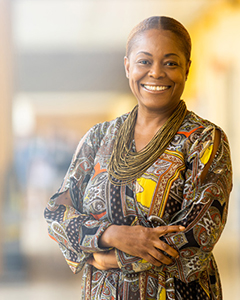 As director of the Center for Global Black Studies in the College of Arts and Sciences and a founding member of the Hemispheric Caribbean Studies Collective, Donette Francis explores the intersection of race, the arts, and the environment in her teaching and research. Her interdisciplinary courses address issues of race, migration, feminism, colonialism, visual culture, and African diasporic and Caribbean literatures and cultures.
As director of the Center for Global Black Studies in the College of Arts and Sciences and a founding member of the Hemispheric Caribbean Studies Collective, Donette Francis explores the intersection of race, the arts, and the environment in her teaching and research. Her interdisciplinary courses address issues of race, migration, feminism, colonialism, visual culture, and African diasporic and Caribbean literatures and cultures.
Francis was born in Jamaica and raised in New York, and her identity was shaped by the arts and the migrant experience. She leads her students to see Miami as an important African-American city, defined by Afro-Caribbean migrations and home to distinctive diasporic communities, and is tireless in her commitment to Black and Brown visual and performing artists.
Read more about Francis's work
Saying yes when the world is saying no: Neri Karra, B.B.A. ’99
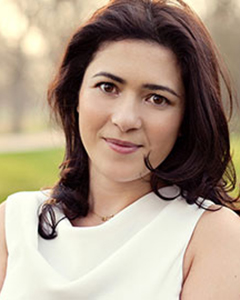 An entrepreneur, author, fashion designer, and academic, Neri Karra has achieved much. Her journey began in Bulgaria and continued through a Turkish refugee camp to Istanbul and, ultimately, the University of Miami, which she attended on a full scholarship and graduated summa cum laude. In a ’Cane Talk in 2016 titled “The Power of Yes and Why,” Karra recounted her journey and emphasized the power of hope and personal resilience.
An entrepreneur, author, fashion designer, and academic, Neri Karra has achieved much. Her journey began in Bulgaria and continued through a Turkish refugee camp to Istanbul and, ultimately, the University of Miami, which she attended on a full scholarship and graduated summa cum laude. In a ’Cane Talk in 2016 titled “The Power of Yes and Why,” Karra recounted her journey and emphasized the power of hope and personal resilience.
In 2000, Karra founded her own brand, which has grown to encompass 27 NERI KARRA boutiques in 14 countries and includes relationships with hundreds of retailers worldwide. Karra has a Ph.D. in management studies from the University of Cambridge, has guest lectured at such prominent institutions as the London School of Economics and Imperial College London, and is the author of two books.

